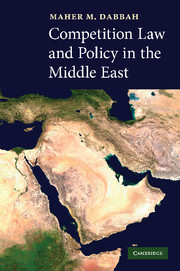Book contents
- Frontmatter
- Contents
- Preface
- List of abbreviations
- 1 Introduction
- 2 The relationship between Islam and competition law and policy
- 3 Israel: the region's oldest competition law
- 4 Turkey: a European dream from the other side of the border
- 5 The Arab Maghreb countries
- 6 Jordan's 2004 Competition Law
- 7 The Gulf States: a possible model for regional cooperation
- 8 The Arab Republic of Egypt: the chase after globalisation
- 9 Lebanon and Syria: a tale of two states
- 10 Conclusions
- Index
9 - Lebanon and Syria: a tale of two states
Published online by Cambridge University Press: 20 July 2009
- Frontmatter
- Contents
- Preface
- List of abbreviations
- 1 Introduction
- 2 The relationship between Islam and competition law and policy
- 3 Israel: the region's oldest competition law
- 4 Turkey: a European dream from the other side of the border
- 5 The Arab Maghreb countries
- 6 Jordan's 2004 Competition Law
- 7 The Gulf States: a possible model for regional cooperation
- 8 The Arab Republic of Egypt: the chase after globalisation
- 9 Lebanon and Syria: a tale of two states
- 10 Conclusions
- Index
Summary
The Republic of Lebanon and the Arab Republic of Syria have always enjoyed a close association. This closeness in relations between the two countries was facilitated by several factors. Notable among these factors is the influence which Syria came to enjoy over Lebanon and its internal affairs. For many years, there was significant Syrian presence in Lebanon which came to be reduced, however, following the assassination of Lebanon's former Prime Minister, Rafiq Hariri, and the adoption of a specific United Nations Resolution demanding respect for the sovereignty of Lebanon. Syrian presence and political influence in Lebanon has not totally disappeared nonetheless and in many ways the two countries remain two independent states with one tale. In the field of competition law and policy though, the Republics have not shared the same platform and have in fact taken different routes towards achieving their goals of instituting domestic competition law regimes.
Lebanon: the walk to the region's most comprehensive competition law
Lebanon is at present on its way to enacting the most comprehensive competition legislation in the Middle East as a whole. The journey to this destination, however, may prove to be very long. To understand Lebanon's reasons for embarking upon such a journey and to assess the real prospects for success in completing it, including the challenges likely to arise on the way, it is necessary to consider some issues of crucial importance first which sit at the heart of the government's decision to turn to competition law and policy.
- Type
- Chapter
- Information
- Competition Law and Policy in the Middle East , pp. 261 - 296Publisher: Cambridge University PressPrint publication year: 2007



